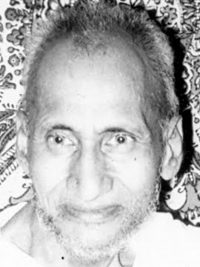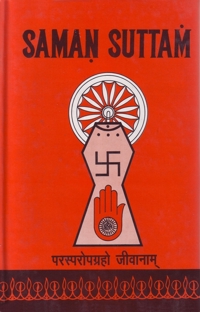27. Avasyaka Sutra
PRECEPTS ON OBLIGATORY DUTIES
Paricatta parabhavam, appanam jhadi nimmalasahavam.
Appavaso so hodi hu, tassa du kammam bhanamti avasam. (417)He who contemplates over the pure nature of soul after renouncing all alien states of mind, becomes really engrossed in himself; this act is called a (real) obligatory duty.. (417)
Avasaena hino, pabbhattho hodi caranado samano.
Puvvuttakamena puno, tamha avasayam kujja. (418)That monk who does not practise the obligatory duties, will fall from (the path of) right conduct, he should observe them following the order set forth. (418)
Padikamanapahudikiriyam, kuvvamto nicchayassa carittam.
Tena du viragacarie, samano abbhutthido hodi. (419)One who performs acts like repentance (pratikramana) etc. attains right conduct viewed from the standpoint of niscayanaya, certainly, on account of that, a monk becomes steadfast in a conduct devoid of attachment. (419)
Vayanamayam padikamanam, vayanamayam paccakhana niyamam ca.
Aloyana vayanamayam, tam savvam jana sajjhaum. (420)Repentance for past evil acts (pratikramana), renunciation form future evil acts (pratyakhyana), vow to refrain from evil acts (niyama), confession of evil acts (alocana) all these are the forms of verbal expressions and so they constitute study (svadhyaya). (420)
Jadi sakkadi kadum je, padikamanadim karejja jhanamayam.
Sattivihino ja jai, saddahanam ceva kayavvam. (421)One who has capacity to practise repentance, should do it by contemplation: a person having no such capacity, ought to have faith in its efficacy. (421)
Samaiyam cauvisatthao vamdanayam.
padikkamanam kaussaggo paccakkhanam. (422)The six obligatory duties are (1) Equanimity (Samayika), (2) Prayer of the twenty-four Jinas (Caturvimsatistava), (3) Obeisance (Vandana), (4) Repentance (Pratikramana), (5) Bodily steadiness to meditate upon soul (Kayotsarga), and (6) Renuniciation from future evil acts (Pratyakhyana). (422)
Samabhavo samaiyam, tanakamcana-sattumittavisao tti.
Nirabhissamgam cittam, uciyapavittippahanam ca. (423)To treat as equal a blade of grass and gold, an enemy and a friend, as also to develop a mind devoid of all attachment and predominantly incline towards performing proper acts, this is what constitutes samayika. (423)
Vayanoccaranakiriyam, paricutta viyarayabhavena.
Jo jhayadi appnam, paramasamahi have tassa. (424)having renounced all utterance of a word and having developed a state of mind devoid of attachment one who concentrates thought on one self is verily possessed of the supreme type of meditation (called parama samadhi or samayika). (424)
Virado savvasavajje, tigutto pihidimdio.
Tassa samaigam thai, idi kevalisasane. (425)One who refrains from all sinful acts whatsoever, who practises the three controls (guptis), who has one.s sense-organs under control is alone possessed of a steadfast samayika this is what has been proclaimed in the discipline preached by omniscients. (425)
Jo samo savvabhudesu, thavaresu tasesu va.
Tassa samayigam thai, idi kevalisasane. (426)One who treats as equal all the living beings whether mobile or immobile is alone possessed of a steadfast samayika this is what has been proclaimed in the discipline preached by omniscients. (426)
Usahadijinavaranam, namaniruttim gunanukittim ca.
Kauna acciduna ya, tisuddhipanamo thavo neo. (427)To elucidate the names of and to devotedly speak about the virtuous qualities of the great Jina Rsabha etc. as also to offer them a worship-this is what constitutes stave (caturvimsatistava or praising the twenty-four tirthankaras0 pure in a threefold; fashion (i.e. in respect of mental states, speech and bodily acts). (427)
Davve khette kale, bhave ya kayavarahasohanayam.
Nimdanagarahanajutto, manavayakayena padikkamanam. (428)A monk practises repentance if being filled with a sense of censure and remorse about himself, he makes a search, with his mind, expression and action, of faults committed by him with reference to any substance, place, time and modes. (428)
Alocananimdanagarahanahim abbhutthio akaranae.
Tam bhavapadikkamanam, sesam puna davvado bhaniam. (429)It after having confessed, blamed and condemned an offence committed by him (a monk) makes resolve not to repeat this offence in the future; it is a real repentance on his part-everything else done in this connection constitutes but a formal repentance. (429)
Ucchaya anunnavana, avvavaham yajatta avanaya.
Avaraha-samana vi, va chatthana humti vamdana e. (430)Obeisance is of six kinds: (1) Expression of desire for salutation; (2) to obtain the permission of his preceptor to go to any place determined by him; (3) to express a desire for completation of religious acts; (4) to go on a pilgrimage with full self-control; (5) Conquest over senses; and (6) to pray for pardon for faults committed through mistake. (430)
Vinaovayara manassa-bhamjana, pujana gurujanassa.
Titthayaranaya ana suyadhamma rahana kiriya. (431)Humility is a must; it dispels pride; it amounts to worship of the preceptor and tirthankaras and it is the obedience of scriptural tenets. (431)
Mottuna vayanarayanam, ragadibhavavaranam kicca.
Appanam jo jhayadi, tassa du hodi tti padikammanam. (432)A monk who meditates upon his soul after renunciation of attachment and other passions, refraining from talking about them, practises repentance in the true sense. (432)
Jhananilino sahu, paricagam kunai savvadosanam.
Tamha du jhanameva hi, savva.dicarassa padikkamanam. (433)A monk who becomes absorbed in meditation renounces all faults; therefore meditation alone is real repentance for all transgressions. (433)
Devassiyaniyamadisu, jahuttamanena uttakalamhi.
Jinagunacimtanjutto, kausaggo tanuvisaggo. (434)At the time of daily ceremonials etc. the renunciation of attachment for one.s own body at the prescribed time, for the prescribed period and with one.s mind concentrated on the virtuous qualities of Jinas this is what constitutes kayotsarga (an immobile state of body). (434)
Je kei uvasagga, devamanusa-tirikkha.cedaniya.
Te savve adhiase, kausagge thido samto. (435)While performing the kayotsarga one ought to face patiently all the obstacles that might be placed in one.s way by a god, a man, an animal, or by the inanimate nature. (435)
Mottuna sayalajappa managayasuhamasuhavaranam kicca.
Appanam jo jhayadi, paccakkhanam have tassa. (436)He who having given up all sorts of talking about and having detached himself from all future thought activities, good and evil; meditates upon his soul, practises renunciation of future evil acts, pratyakhyana in a true sense. (436)
Niyabhavam na vi muccai, parabhavam neva genhae keim.
Janadi passadi savvam, so.ham idi cimtae nani. (437)That, which never gives up its own nature, that which never assumes another one.s nature, that which knows and sees everything whatsoever is.I.. Thus should be the meditation of an intelligent person. (437)
jam kimci me ducaritam, savvam tivihena vosire.
Samaiyam tu tiviham, karemi savvam nirayaram. (438)Whatever evil act has been performed by me that I renounce in a three fold fashion (i.e. through mind, speech and body) and I perform samayika in a threefold fashion without any transgression. (438)
 Jinendra Varni
Jinendra Varni

